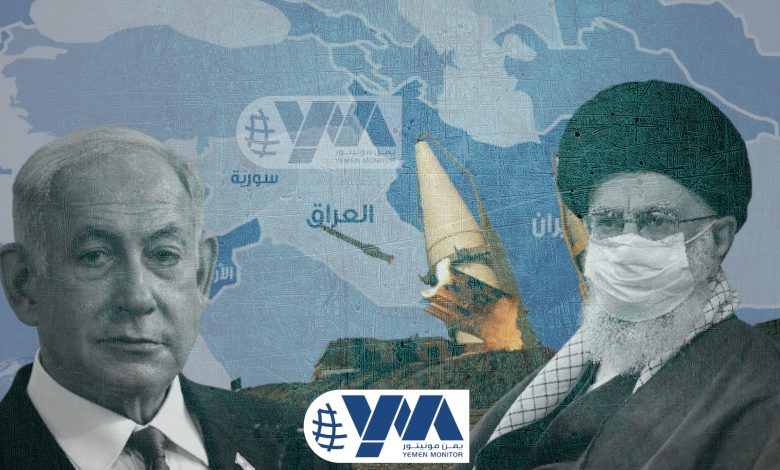
Yemen Monitor/Newsroom:
Iran has said that its April 14 attacks on Israel were in response to Israeli war jets targeting an Iranian consulate in Syria earlier this month, leading to the death of its senior military commanders.
The commander of the Iranian Revolutionary Guard Corps (IRGC), Hossein Salami, said, “This operation could have been a large-scale operation, but we limited the scope of the operation to that part of the capabilities that the Zionist regime had used to attack the embassy of the Islamic Republic of Iran and martyr the commanders.”
According to the Pentagon, the announced response of the Islamic Republic was “launched from Iran, Iraq, Syria and Yemen”where Tehran leads a network of rebel groups and powerful militias who wage their war against Israel and the United States in various ways in support of the Palestinians in Gaza Strip.
Iran’s unprecedented attack on Israel marked a change in approach for Tehran, which had relied on proxies across the Middle East since the start of the Israel-Hamas war in October. All eyes are now on whether Israel chooses to take further military action, while Washington seeks diplomatic measures instead to ease regional tensions.
The news media has been complicit in its portrayal of the regional war as nonexistent. “Biden Seeks to Head Off Escalation After Israel’s Successful Defense,” the New York Times blared this morning, ignoring that the conflict had already spread. “Iran attacks Israel, risking a full-blown regional war,” says The Economist. “Some top U.S. officials are worried that Israel may respond hastily to Iran’s unprecedented drone and missile attacks and provoke a wider regional conflict that the U.S. could get dragged into,” says NBC, parroting the White House’s deception.
Analysts say Iran sent a message that it would be willing to escalate and change its rules of engagement in its shadow war with Israel.
“It’s a warning shot, saying that if Israel breaks the rules, there are consequences,” said Magnus Ranstorp, strategic adviser at the Swedish Defense University.
The Washington-based reporting follows repeated Biden administration statements that none of this amounts to a regional war. “So far, there is not … a wider regional conflict,” Pentagon press secretary Brig. Gen. Pat Ryder said on Thursday, in response to a question about Israel’s strike on the Iranian Embassy. Ryder’s statement followed repeated assertions by Iranian leadership that retaliation would follow — and even a private message from the Iranians to the U.S. that if it helped defend Israel, the U.S. would also be a viable target — after which the White House reiterated its “ironclad” support for Israel.
Despite this unambiguous regional network, and even after Israel’s attack on Iran’s embassy in Syria earlier this month, the Biden administration has consistently denied that the Hamas war has spread beyond Gaza. It is a policy stance — and a deception — that has held since Hamas’s October 7 attack. “The Middle East region is quieter than it has been in two decades,” Biden’s national security adviser Jake Sullivan said in an ill-timed remark eight days before October 7. “We don’t see this conflict widening as it still remains contained to Gaza,” deputy Pentagon press secretary Sabrina Singh said the day after three U.S. troops were killed by a kamikaze drone launched by an Iran-backed militia at a U.S. base in Jordan. Since then (and even before this weekend), the fighting has spread to Iraq, Syria, Jordan, and Yemen.
Israel confirmed that almost all the over 300 drones and missiles launched overnight by Iran were shot down by its anti-missile defense system, backed by the U.S. and Britain. The sole reported casualty was a wounded girl in southern Israel, and a missile struck an Israeli airbase, causing light damage.
On their side, Israel’s military says 99 per cent of the missiles and drones were intercepted and that the few that did get through inflicted only minimal damage on a military base in the country’s south.
Iran has managed to strike a balance between retaliating publicly for the strike in Damascus and avoiding provoking further Israeli military action leading to a much wider conflict, said Mona Yacoubian, vice president of the Middle East and North Africa center at the U.S. Institute of Peace.
“Both (Iran and Israel) are able at this point to claim victory and step down off the precipice, particularly since there were no Israeli civilians killed,” Yacoubian said.
The world was still waiting, however, for the result of an Israeli War Cabinet meeting on Sunday. Israeli hard-liners have pushed for a response, but others have suggested restraint, saying Israel should focus on strengthening budding ties with Arab partners.
“We will build a regional coalition and collect the price from Iran, in the way and at the time that suits us,” said Benny Gantz, a member of the War Cabinet.
Iran maintains that it does not seek all-out war across the region. Foreign Minister Hossein Amirabdollahian said in a post on X, formerly Twitter, that Iran has “no intention of continuing defensive operations” at this point unless it is attacked.
The decisions that Israel’s war cabinet takes in the hours and days ahead about what comes next in its now open shooting war with Iran could represent a pivotal moment in the history of the conflict in the Middle East.
From Iran’s view, its unprecedented overnight drone and missile attacks on military targets in Israel represent a settling of scores that should not trigger further military escalation.
But for many Israelis, Iran’s actions amount to an outright declaration of war.
Should, as the United States and other Western nations are reportedly urging, Israel accept the so-called “off ramp” Iran claims it has offered, or will Israeli leaders forge ahead with further military escalation against the Islamic regime, possibly hitting targets in Iran itself?
The early indications are that Israel’s government is strongly leaning toward the latter.
“This is something that will have to have a major response,” said Likud Party Knesset member Hanoch Milwidsky, a close ally of Prime Minister Benjamin Netanyahu.
“You cannot have an attack like this left untreated,” he told the BBC Sunday morning.
There are multiple reports that U.S. President Joe Biden has told Netanyahu to back down, and if Israel proceeds with more military action his country will not have U.S. support for a counterattack against Iran.




